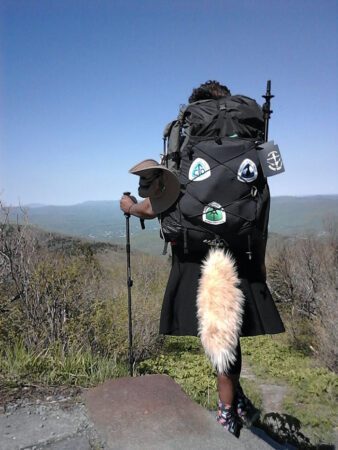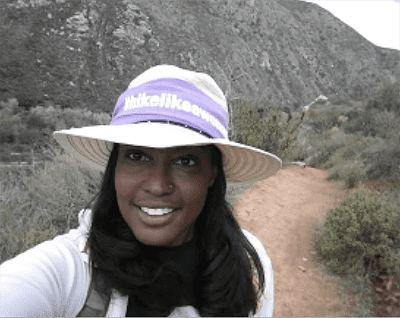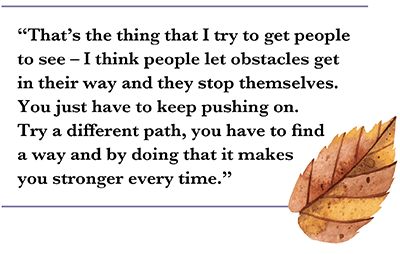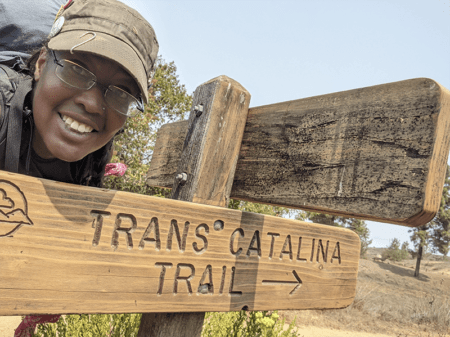Two GISTers Share How They Are Reaching Their Goals
GIST patients face many obstacles and challenges to get to a place where they’d say they were thriving. Physical challenges from surgeries, pain and side effects can severely change the lifestyle and activities they enjoyed before GIST. Two GISTers, Elsye and Stijn, one from the U.S. and one from Belgium, had to face those changes and both decided they wouldn’t accept an altered version of life and strove for something more.
Elsye Walker – Triple Crown Hiker
 Elsye was living in Tahoe, Nevada in December of 2020, working as a lift operator at a popular ski resort. Skiing was a passion for this Flint native as well as a love of nature. She had spent the last six years working seasonal gigs that kept her outdoors and gave her the freedom to work six months and hike for the other six.
Elsye was living in Tahoe, Nevada in December of 2020, working as a lift operator at a popular ski resort. Skiing was a passion for this Flint native as well as a love of nature. She had spent the last six years working seasonal gigs that kept her outdoors and gave her the freedom to work six months and hike for the other six.
“I don’t think I was cut out to be ‘normal’. I tried the traditional route: went to college, got my master’s degree in Community Planning, got married, got a house, and then realized that this was not the kind of life that I wanted. I wanted to do and see other things and especially travel and that’s what I’ve been doing for the last twenty years. And I learned, during that 20 years, that I’m stronger than I thought,” Elsye said about her lifestyle.
That December, Elsye had been making plans to take avalanche training and do some backcountry skiing, but she started to feel unwell. This feeling lasted about two weeks. She’d just returned to Tahoe from a trip to Joshua Tree and was feeling wretchedly tired. She thought it could possibly be Covid so she went to the hospital to be tested and passed out in the parking lot. It turned out that Elsye was severely anemic and had lost enough blood to warrant a transfusion.
“And that’s when all the tests started, and they found out about the tumor. It was lucky that I went to the hospital for that Covid test instead of just urgent care,” she shared.
Once the doctors told her that she needed surgery right away, (January 2021) Elsye traveled home to Michigan. “My family insisted that I come home. My family has a history of cancer so they wanted me to go to a center they trusted. They removed the tumor (clear margins) and did a partial gastrectomy.
The doctors at the Karmanos Cancer Institute in Detroit are very familiar with GIST. They took really great care of me.”

Elsye Walker
Elsye was in the hospital for a month after her surgery because she was also dealing with fluid in her lungs which required a stent. A month later, in April, she began a regimen of Gleevec, heart medications, and acid reflux drugs. Her personal plan was to return to life as normally as she could as soon as she could. For most of us that would be a big challenge.
Elsye was encouraged at a young age to do whatever she set her mind to by her parents and she took this mindset into her GIST journey. “Even though I grew up in Flint, as a child, my parents always said to us kids, ‘whatever you want to do, you can do it,’ and that’s how I have always lived. I biked across Iowa 11 years in a row, I’ve done Burning Man, and I’ve been skiing since 4th grade. I like to get out and try new things, do exciting things, adventurous things.”
Elsye accomplished the Triple Crown of Hiking (before her GIST diagnosis) which means that she has hiked the Appalachian Trail (2,193 miles in 2016 & 2018), the Pacific Crest Trail (2,654 miles, 2015), and the Continental Divide Trail (3,100 miles, 2017). She is the first Black woman to complete all three trails. She commented that the Continental Divide Trail was her favorite because of the sights, challenges, and people she encountered along the way. After her surgery, she wanted desperately for her life to go back to “normal” as if nothing had changed. Training, however, for multi-week hikes is intense. Elsye said, “When I’m training for a long hike, I build up to 20-mile days.”
 “On those long hikes, you have nothing but time to think. All those things in your regular life that you push to the back of your mind. Those things all of a sudden are front and center and you ruminate over them, over and over, until you figure it out. You can’t escape yourself out there. It’s also very meditative to hike like that every day. To feel like you don’t have all that noise in your head. It’s also a very creative space for me. I wrote a poem out there once. It really clears your head,” Elsye said of the solitude on the trail.
“On those long hikes, you have nothing but time to think. All those things in your regular life that you push to the back of your mind. Those things all of a sudden are front and center and you ruminate over them, over and over, until you figure it out. You can’t escape yourself out there. It’s also very meditative to hike like that every day. To feel like you don’t have all that noise in your head. It’s also a very creative space for me. I wrote a poem out there once. It really clears your head,” Elsye said of the solitude on the trail.
As she recovered and learned about her body post-surgery/new treatment, she said that she “planned to take the summer to do a lot of short hikes and build up my strength in order to hike the Arizona Trail in the fall which is 800 miles.
“Hopefully I can get my body ready for that. I need to do it mostly to reassure myself that I’m back and that everything’s ok.” She continued, “I’ve had tons of tricky situations. Animals, running into bears, being awakened by a grizzly bear, other sketchy hiking situations. When I hiked the Pacific Crest Trail, my first trail, about a thousand miles in, I fractured my ankle. At the time I thought it was a sprain so I just kept hiking and pushing through that. The doctors I finally saw couldn’t believe it. And I continued to finish the other two trails and I still haven’t had that ankle fixed…I have a lot of women who connect with me about hiking and they’re afraid and I think as women we have that put into us as young girls. We’re not as strong or we’re fragile. And it just kind of lives inside of you. And if women start being stronger and believing that they’re stronger, we will be stronger. You will be stronger. You can be afraid but keep moving forward.”
“Training for the Arizona trail made me realize it wasn’t about the trail at all, it was about facing my own fears. Fear that I wasn’t that strong woman, that I was not the same. But I’m not the same. Cancer treatment not only affected my physical health, but it also affected the way I feel, think, and even the things I like to do. Just like a long hike I am stronger for going through it.”

Elsye on her latest hike post diagnosis.
Moving forward, Elsye has returned to hiking, exploring what she can and can’t do. The days after surgery were filled with ‘can’t’ do, muscle pains, and digestive issues, “Learning to live with a cancer diagnosis has been difficult and very stressful. But you guessed that. The change in my cognitive/physical abilities has caused significant distress. I become overwhelmed, at times, with multiple tasks, distractions. Just leaving the house for a social occasion leads to stress. I’m used to hiding that though. The muscle soreness and hip pain really blows as you may have heard I like to walk. My long walk plans will now be different than before and that’s ok,” Elsye wrote in her blog, Wandering Chardonnay – Life Explorer.
Elsye also wrote this entry before her first long hike this past August, a multi-day trail, the Trans Catalina Trail (38.5 miles) – “Waking up in my tent I felt the familiar pit in my stomach like before every backcountry hiking trip. But this was kinda different. I can’t do this. I’m not sure I want to do this, what if something goes wrong, breaks, hurts…When did I become this person? Oh, yeah it came with my cancer diagnosis. Side effects: Fear and self-doubt.”
Elsye commented on this recently:
“The thing about long-distance hiking is you realize not only your plans will change, but so will your path. Embrace the change and keep moving forward. Hiking the Arizona Trail is not in the cards for me this fall. But short hikes from Joshua Tree National Park to the La Jolla coast are; different is good. Now to tune up those skis because the mountains are still calling.”
Read more about Elsye’s adventures & dealing with GIST on her blog at https://wanderingchardonnay.com/ and elsyew on Instagram.
Read part two of this article – Stijn Belmans’ story.
And remember…
Every GISTer has challenges due to surgeries, and medications, and their side effects. No one is suggesting that every patient become a super athlete. These stories are meant to inspire you to work towards the best life you can live as you thrive with GIST whatever that looks like. If you are having issues with fatigue, please consult your oncologist for ways to overcome this. In our experience in talking with patients and physicians, treatments, anemia, low B12, and lack of activity can contribute to fatigue. Please consult with your physician before making any changes in your medicines, supplements, or exercise routine. You are also welcome to join the LRG community and our GIST Chat forum where GISTers privately discuss their GIST journeys and how they work to thrive.




